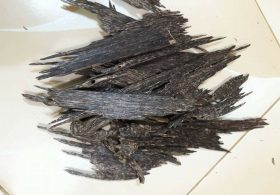THE WORLD OF OUD
What is Agarwood?
Agarwood, or commonly known as Oud in the Middle Eastern world, has gained considerable interest and popularity in the West in recent times, with famous designer brands launching their own Oud fragrance, such as Giorgio Armani’s Oud Royal and Tom Ford’s Oud Wood. Arabian Oud, the mass producing house of Arabian fragrances recently swept majority of awards at FiFi 2012, a ceremony akin to the Oscars of the fragrance world.
Oud, Oudh, Aloeswood, Agarwood, Gaharu (different names for the same meaning) is the common name for the tar-like resinous heartwood that forms in the ancient Aquilaria and some Gyrinops species of trees that are native to the dense forests of South East Asia.

The heartwood of the tree produces this dark aromatic resin as part of its natural defence mechanism when infected with fungus (Phialophora Parasitica). This resin can be produced either through natural causes of the wild or through the artificial means of inoculating it with resin-inducing substances.

A cultivated agarwood tree that was harvested, revealing a resin infected heartwood
The greater the infection of the tree will result in the heartwood of the Aquilaria trees bearing a hallmark high-grade oud wood – a dense, pitch-dark and resinous wood which would otherwise be light and pale-coloured if uninfected. It is worth to note that not all Aquilaria trees can be found producing this resinous heartwood and it is said that for every ten trees in the wild, only one will have its heartwood considerably infected.
As for artificial inoculation of cultivated Aquilaria trees, it has been established that there is no certainty or guarantee that the tree will produce resin despite the human intervention. It is this resinous heartwood that can be known as jinko, oud, oudh, ki-nam, kyara, gaharu, aloeswood, eaglewood, chen xiang or agarwood according to the different cultures, that is prized and loved by all due to its rarity and the distinct and unique aroma it produces. To put it simply, the aroma of agarwood will just permeate the nostrils and leave you intrigued by its exquisite and complex scent, making you yearn for more.
Agarwood, or commonly known as Oud in the Middle Eastern world, has gained considerable interest and popularity in the West in recent times, with famous designer brands launching their own Oud fragrance, such as Giorgio Armani’s Oud Royal and Tom Ford’s Oud Wood. Arabian Oud, the mass producing house of Arabian fragrances recently swept majority of awards at FiFi 2012, a ceremony akin to the Oscars of the fragrance world.
History of this Time-Honoured Fragrance
Its interest is of no wonder, considering that Agarwood or Oud (not to be mistaken for Bakhoor) has been around for centuries since the ancient times of the Sanskrit, Torah, Gospel and the Muslim scriptures.
The Prophet Muhammad (peace & blessings be upon him) held the tradition of fumigation with agarwood which continues in the Muslim world up to this day. The Holy Prophet made known that agarwood is a distinct item of Paradise in his saying, “The first group of people who will enter Paradise, will be glittering like the full moon and those who will follow them, will glitter like the most brilliant star in the sky. They will not urinate, relieve nature, spit, or have any nasal secretions. Their combs will be of gold, and their sweat will smell like musk. The aloes-wood will be used in their centers..”. The Messenger of God also revealed the numerous healing properties of agarwood, which in the particular saying, referred to Hindi Oud and its effectiveness in treating pleurisy.
The extremely wealthy ancient Chinese used to make their coffins out of this aloeswood while in Buddhism, the most precious Buddhist string of beads numbering to 108 is made of agarwood. One story tells of a monk’s sacrificing spirit in which he grinds one of his agarwood beads into powder whenever he met the sick in order to cure them with it, which resulted with even the seriously stricken person getting well.
The Song of Songs describes King Solomon (peace be upon him) as “coming up from the desert like a column of smoke, perfumed with myrrh and incense” and there are numerous references throughout this book of the Old Testament to “every kind of incense tree” which popular belief denotes to Oud. The bible mentioned several citations of Oud, including a text in which Jesus (peace be upon him) is said to have been perfumed with aloes (Oud).
Stories tells us of the extreme habits of luxury of King Louis XIV of France, who had the practice of washing his clothes in Oud. Agarwood also has been associated with the Chinese tradition of Fengshui, a discipline of governing the flow of energy in a particular place, and the Oud wood


